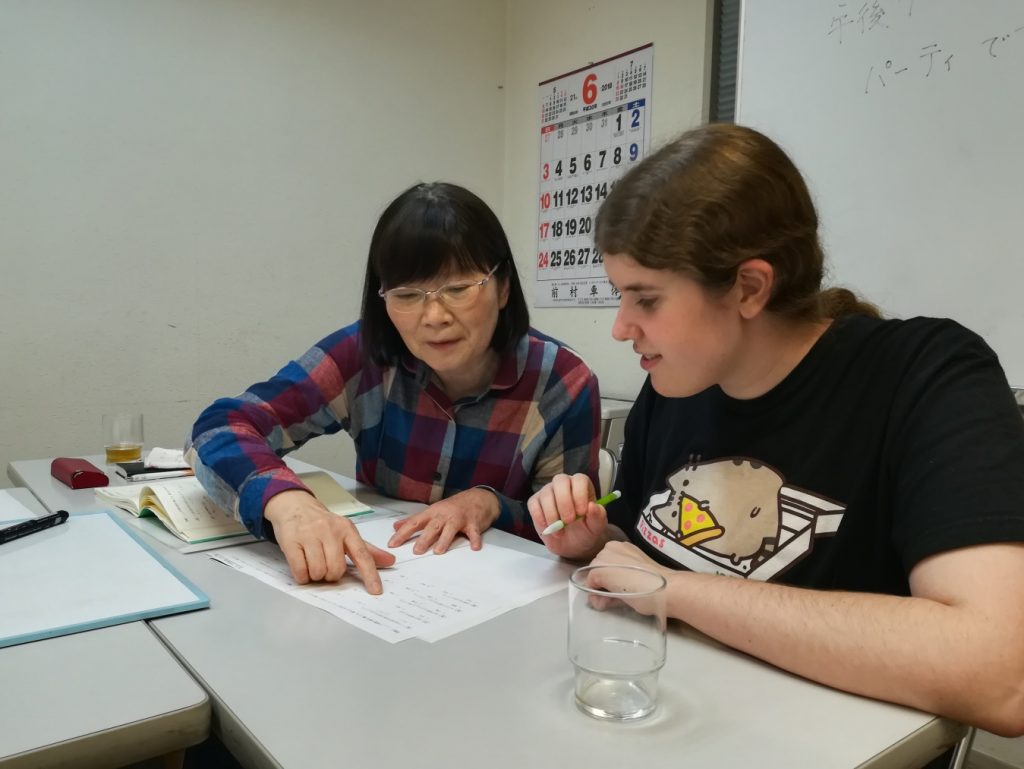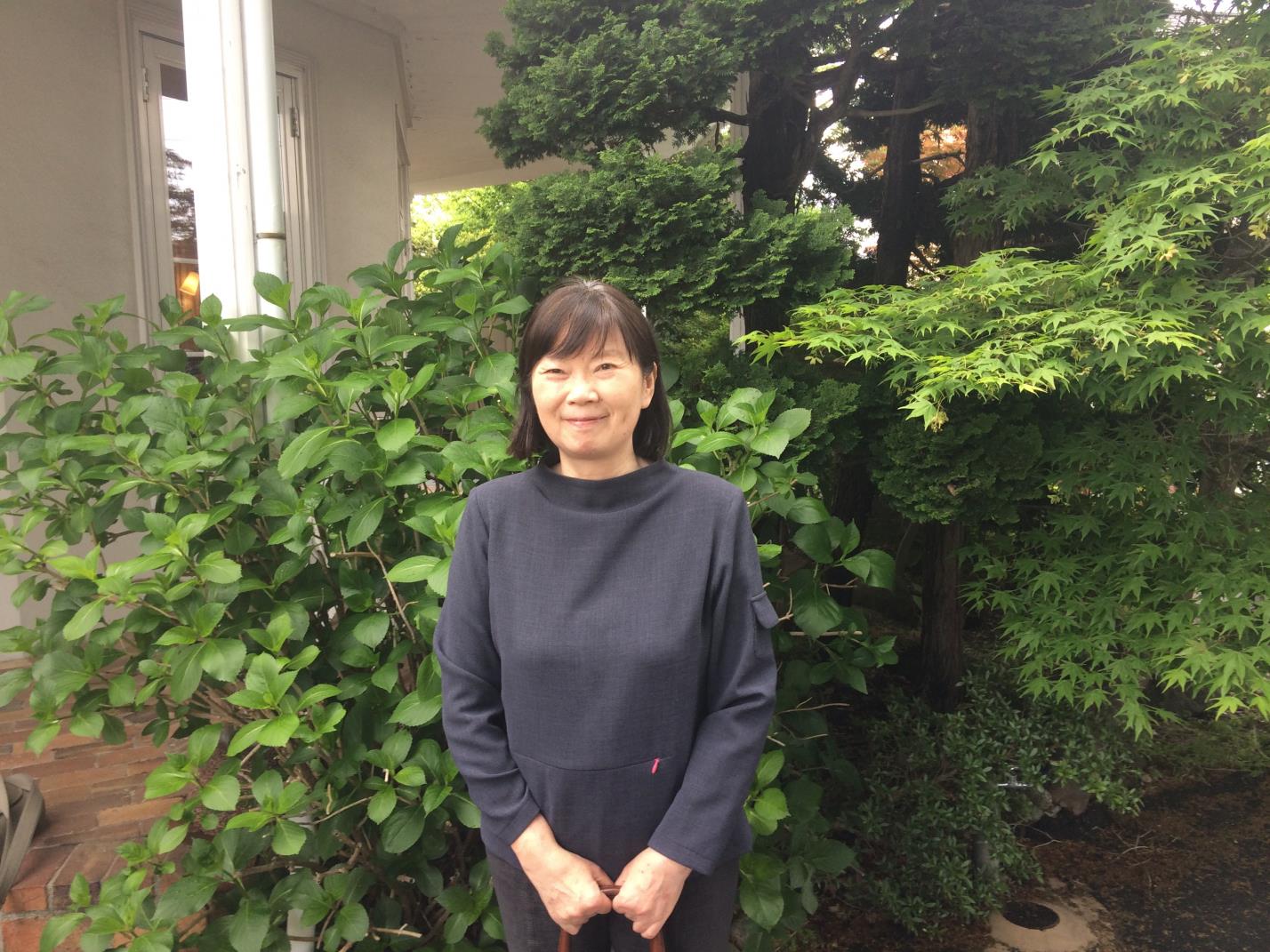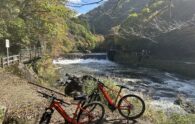Researchers often ask us about learning Japanese, so I went to get advice from the local expert on that topic. Ms. Minako Kato, aka “Kato-sensei,” has been teaching Japanese to learners from all walks of life for 34 years. She has been teaching Japanese around Oshu City since 1996.
Profile
Minako Kato is from Oshu City and is 61 years old. After teaching middle and high school students, she started her career as a Japanese teacher for non-native speakers to interact with people from other countries. She has been a Japanese teacher for 34 years.
“When we meet the researchers, we can see what their situation is, what kind of Japanese each person needs to learn, and how they want to schedule lessons. During working hours is one possibility. During free time is another. We could match Japanese teachers with researchers depending on when and how often they can study: twice a week at night or something like that.
1:1 lessons or lessons with just a few learners would be ideal, like one teacher to two or three students. That way we can build up a relationship of trust and relax with each other, study without getting too nervous. It might be difficult to learn Japanese from friends or coworkers. If you’re working together, you could end up using the common language for that workplace for whatever reason.
Do I think there will be enough Japanese teachers? We’ll need to see what the demand is. Not all researchers might want to study with a teacher. But I think the network of Japanese teachers throughout the prefecture can work together to meet their needs. We can work out a system.
It might be fun for the researchers to come to Tuesday classes at ASUPIA (Mizusawa Regional Exchange Hall) once in a while, to meet and chat with other Japanese learners living in the community. We’re a very relaxed bunch, people attend when they want to, and our door is always open.

I recommend learning hiragana and katakana before you come. It doesn’t take that long to learn and makes life a lot more convenient. You don’t necessarily need to worry about kanji yet, you can do that later.
I’ve started to think recently that teaching hiragana is easier and more fun to remember if you just start making words and sentences from the beginning. For example, start with いす(isu, chair). Then switch to a verb, すわる (suwaru, sit). Then make a short sentence. いすにすわる(isu ni suwara, sit in chair). Then you can start to learn what words go with each other.
Learning Japanese doesn’t need to start with a scary wall of text. We can start with words, easy sentences, about whatever you’re interested in or curious about. Your hobbies, your everyday life. Whatever makes you stop and think “what’s this?” Share that with your teacher and we can start lessons from there.
It’d be lovely if ILC researchers are interested in Japan and share what they learned with others. If they could learn Japanese while they’re here, that’d be even better. We’re flattered when people are interested in learning Japanese, this kind of niche language used only in Japan.”
Are you interested in studying Japanese in Oshu City or have any other questions? Please contact Oshu International Relations Association at yisasupia@catv-mic.ne.jp or 0197-22-6111.
Oshu International Relations Association Homepage: Click here
Japanese
日本語ってどう覚えればいいのか? 「加藤先生」に聞いてきました研究者に日本語学習について聞かれることが多いので、その分野の「専門家」に聞くことにしました。加藤美奈子先生は日本語講師として34年もの経験があります。1996年から奥州市周辺で日本語を教えてきました。
<プロフィール>
加藤 美奈子(かとうみなこ)
奥州市出身で、61歳。
中学と高校の国語の講師などを得て、日本語を教えることで、世界の皆さんと交流したいと思い、日本語講師になった。34年にわたって外国人のための日本語教室を開催している。
「まず研究者に会ってみて、一人一人がどのような日本語を必要としているのか、どんな時間に日本語を勉強したいのかを確認することですね。職場で勤務時間内に教えることもできますし、空いている時間帯に教えることもできます。教わりたい時間帯が分かれば、教えてもらいたい人と、教える人のマッチングもできます。
マンツーマンか、先生1人に生徒2~3人くらいの少人数グループが理想的だと思います。そうすると、信頼関係を築きやすく、お互いに緊張感なくリラックスした形で勉強できます。同僚や友人に教えてもらうというのは、お互いに遠慮したりしてなかなか難しいと思いますね。また、仕事上は共通言語を使うのではないかと。
今いる日本語教師が不足するかどうかは、需要と供給のバランスを見てみないと分かりませんね。来た人がそういう形で勉強したいと思わないかもしれません。供給が足りなかったとしても、岩手県内にいる日本語教師が連携して、対策を考えれば対応できると思います。
アスピア(奥州市水沢にある地域交流館)で開催される日本語教室に来れば、どういう人たちがこの地域に来て生活しているのかが分かります。また、いろいろな人と交流もできます。日本語教室は、とてもリラックスした感じでふらっときて参加できるような集まりなのでね。ドアはいつも開いていますから。
日本に来る前に、ひらがなとカタカナを身につけることをお勧めします。すぐ覚えられると思いますし、読めると生活が便利になります。漢字は、後で大丈夫ですよ。
最近、ひらがなを覚える時に「あいうえお」の順番通りにではなく、単語と短い文を使った方が分かりやすいのかなと思うようになりました。
例えば、「いす」と言ったら、今度は動詞の「すわる」にします。次は「いすにすわる」にして短い文にします。そうすると、どんな言葉がよくセットで出てくるのかが分かりますし、助詞の勉強にもなります。
「日本語を勉強する」ときは長い文章ではなく、単語と短い文章から、興味のあるところから入っていいと思います。趣味や日常生活、自分が「あれ? これは何だろう」と思ったところを先生に聞いて、そこから一緒に日本語勉強の第一歩を踏み出せばいいんです。
ILCの研究者が日本に興味を持ってもらえると、私たちも「嬉しいな」と思います。また、その研究者が誰かにそれ日本で興味を持ったことを伝えたり、日本語を覚えてもらったら、それは二重に嬉しいです。」
奥州市で日本語を勉強したい方、その他の質問がある方、奥州市国際交流協会までお問い合わせください。メール: yisasupia@catv-mic.ne.jp, 電話: 0197-22-6111.




